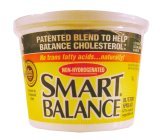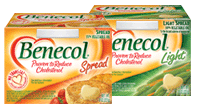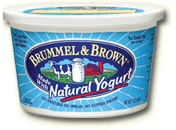There’s lot of confusion about butter, margarines, and their substitutes. Butter/margarine substitutes that avoid the negative aspects and provide modest health benefits are available, but I find that people confuse what's what. So here’s a brief primer.
Butter--Avoid it. Plain and simple. Butter is a rich source of saturated fat. Of 11.5 grams total fat per tablespoon, 7.3 grams are saturated. It is not better than margarine, contrary to simple-minded reports from some media sources. Butter raises LDL cholesterol, raises blood pressure, and has been related to various cancers.
Margarine--Not better than butter, arguably worse. Some argue that the trans-fatty acids, or hydrogenated oils, used to solidify vegetable oils to make margarine solid are worse than butter. In addition to the ill-effects of butter, margarine reduces HDL and raises cancer risk, perhaps even more than saturated fats. Hydrogenation yields a very unnatural structure that modifies cellular behavior of the sort that may promote the appearance of cancer cells. More recently, however, some of the major manufacturers, like Blue Bonnet, have produced soft spread products without hydrogenation. These are reasonable substitutes when used sparingly.
Smart Balance--This is a product made with canola oil, a source of monounsaturates (the best oil source after omega-3s), but manufactured without hydrogenation and therefore has no trans-fats. It does have, in my view, a bit too much saturated fat (1.5 gm per tbsp. in the 37% Light Spread; 2.5 gm per tbsp in the 67% regular spread). This is a reasonable product to use in small quantities. 
There is also a Smart Balance Omega PLUS product that contains added flaxseed oil and sterol esters. I do not recommend this product because of the sterol content (see below). I also object to the manufacturers who label their products “rich in omega-3s” when they mean linolenic acid (in flaxseed), which is converted to a trivial quantity of omega-3s. Linolenic acid may pose unique benefits of its own, but it should not be listed as an omega-3 source.
Benecol--This is a butter substitute that contains stanol esters, a substance that reduces total and LDL cholesterol. Two tablespoons a day reduces LDL around 20 mg/dl, more or less depending on your starting cholesterol. 
There’s a light and regular spread. The light contains 20 calories less per tablespoon but somewhat less monounsaturates, but the same LDL-reducing stanol esters. The manufacturer does hydrogenate the oils, yielding 0.5 mg trans-fats per tablespoon--a small drawback.
Take Control--Similar to Benecol, but made with sterol esters. Take Control also reduces LDL cholesterol. However, data from several high-quality studies from Finland suggest that sterol esters may, in some people, be absorbed into the blood. This is potentially concerning. There is a rare disease called sitosterolemia that results in coronary disease in teenagers and young adults in their 20s from increased absorption of sterol esters. While you can’t acquire this genetic disease, some people have the capacity to absorb sterol esters from their intestines very efficiently. I find it very disturbing and I suggest that you stay away this product and other sterol-containing products like HeartWise orange juice and Smart Balance Omega PLUS until the issue is clarified and safety assured.
Brummel and Brown--A blend of vegetable oils (soybean and partially hydrogenated soybean) with calories and fats reduced by blending in yogurt. This is an okay product. The hydrogenation yields trans-fats below the FDA required declaration limit of 1.0 mg. 
There’s also 1.0 mg each of saturated and monounsaturated fats. The calories are relatively low as a consequence of the added yogurt, only 45 calories per tablespoon. This makes the Brummel and Brown a reasonable choice.
Other products are making their way out to supermarkets. Look for the type of oil used. Canola, olive, and flaxseed are the best. Also look for trans-fats and saturated fat content; both should be low, preferably <1.0 mg per tablespoon, ideally none.
The best choice among the above products in my view is Benecol, though it’s also the most expensive. It will yield substantial drops in LDL cholesterol. All the products in our informal tastings taste a lot like butter, or at least as well as we can remember what butter tasted like! The key with all of these products is use in moderation, since they all provide between 4580 calories per tablespoon.